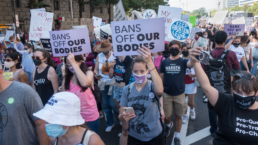The overturning of Roe v. Wade would seriously hinder women’s education, employment, and earning prospects.
By Sheelah Kolhatkar, The New Yorker
Last December, oral arguments were held before the Supreme Court in Dobbs v. Jackson Women’s Health Organization, the case leading to the leaked draft opinion last week that, if finalized, would overturn Roe v. Wade. During one especially illuminating moment, Chief Justice John Roberts attempted to draw Julie Rikelman—the litigation director of the Center for Reproductive Rights, who was arguing to have a ban on abortions after fifteen weeks in the state of Mississippi overturned—into a back-and-forth about the significance of the cutoff for having access to an abortion. Rikelman made a broader argument, that narrowing women’s access to the procedure could disproportionately harm low-income women or those experiencing personal crises. She turned to numbers to bolster her argument. “In fact,” Rikelman said, “the data has been very clear over the last fifty years that abortion has been critical to women’s equal participation in society. It’s been critical to their health, to their lives, their ability to pursue—”

“I’m sorry, what—what kind of data is that?” Roberts interrupted.
When Rikelman tried to answer, Roberts interrupted again. “Well, putting that data aside,” he said, “why would fifteen weeks be an inappropriate line?”
Listening to the exchange, Caitlin Myers, an economics professor at Middlebury College who studies gender, race, and the effects of reproductive-health policies on people’s lives, was stunned. Why would a Supreme Court Justice, in considering such a crucial issue, not be interested in knowing “the data”? Roberts’s colleagues signalled a similar disregard in the draft opinion for the Dobbs case that was published by Politico: the Justices behind the opinion seemed not to care about the issue. Where the original Roe decision acknowledged that making people carry and raise unwanted children could “force upon” women “a distressful life and future,” the draft opinion, written by Justice Samuel Alito, barely mentioned the substantial ways that the loss of access to safe, legal abortion would hamper the ability of women to participate fully in society.
Recent Posts
‘Unconstitutional. Unethical. Authoritarian.’ ICE Bars Millions Of Immigrants From Bond Hearings
July 18, 2025
Take Action Now One watchdog said the new policy “seems like a blatant attempt to stop them from exercising their right to due process.”……
Americans Are Not Nearly Alarmed Enough About Climate Change
July 18, 2025
Take Action Now Americans still don’t comprehend how imminent, dangerous, and far-reaching the threat is—and journalists are partly to blame.By…
The IRS Is Building A Vast System To Share Millions Of Taxpayers’ Data With ICE
July 17, 2025
Take Action Now ProPublica has obtained the blueprint for the Trump administration’s unprecedented plan to turn over IRS records to Homeland Security…
Israel’s Sudden Assault On Syria Is Unchecked Aggression
July 17, 2025
Take Action Now Jerusalem is bombing Damascus and threatening al-Sharaa’s rule, while Washington was hoping to help the nascent government on…




